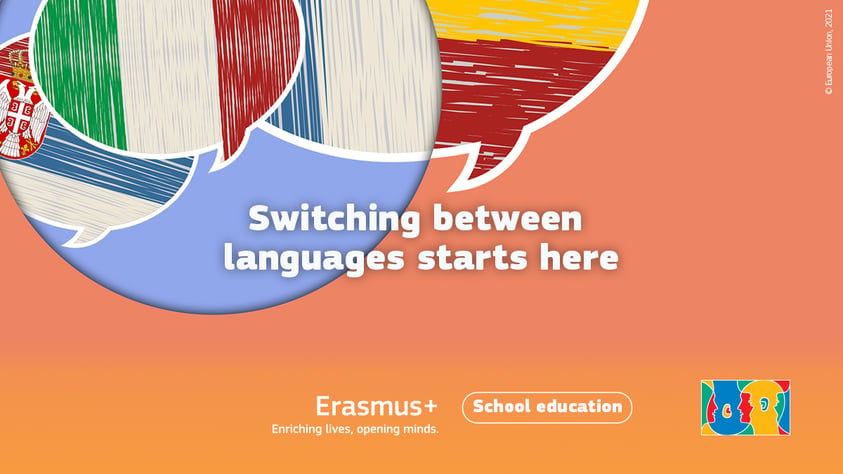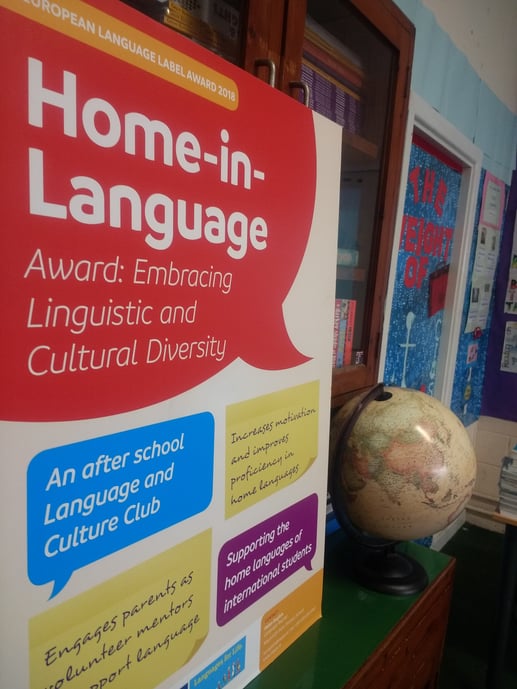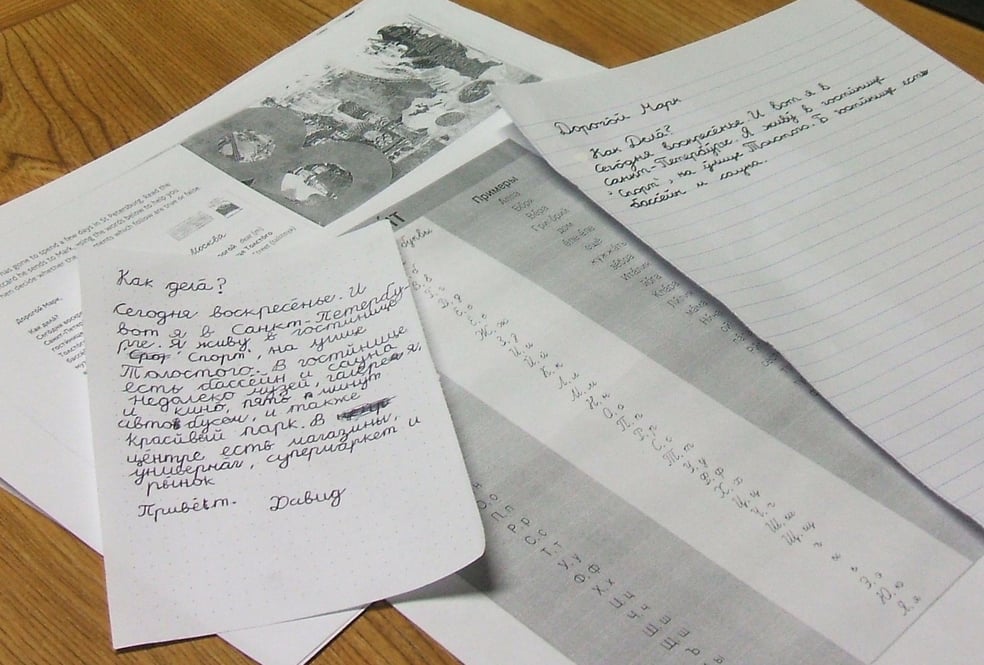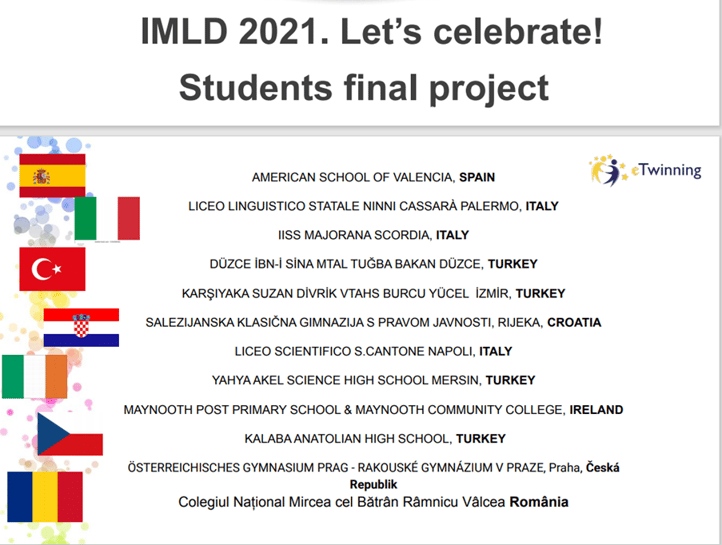Learning the Language of Connection through Erasmus+
To mark International Mother Language Day, we chatted with Helen English, a language teacher at Maynooth Post-Primary School. Recently included in the EUWomen4Future campaign, Helen has dedicated years to promoting the importance of language acquisition and cultural diversity through a number of projects funded through Léargas. From Erasmus+ School Education mobility projects to winning the European Language Label Award, to her recent involvement in an eTwinning language project, Helen charts the progress and long-term impact of her projects, on both a personal and professional level.
What started with a TCA and culminated in inclusion in a European campaign is testament to Helen English's dedication to language acquisition and overall devotion to cultural celebration and integration. The EUWomen4Future campaign showcases women's work and values their incredible accomplishments in the fields of Science, Research, Innovation, Education, Youth, Culture and Sport. And yet, as evidenced by her reaction to the news of her inclusion, it's clear that Helen's commitment is innate - born of nothing more than a genuine desire to support and empower her students.
"I was astonished, to be honest, to be selected for that," she says. "You know, I’m a secondary school teacher, it’s just what I do routinely. And suddenly for that to be picked up and shared across Europe, I was truly astonished. It’s a great boost. I’m honored to be included with so many other women who have made contributions in their own fields, whether it’s research or innovation or culture or education."

Setting the scene for what has been an incredibly impactful number of years for staff and students alike in Maynooth Post-Primary School, Helen tells us: "It began with an invitation to go to a few TCAs (Transnational Cooperation Activities, an Erasmus+ opportunity for professional training and learning)."
"I remember in 2018 going to Bratislava and the focus was on inclusion, [and] inclusive strategies in our schools. Actually, not necessarily schools, there were also various centres for marginalised communities and so on. It was lovely. It was a wonderful experience to meet up with people working in these kinds of areas from different European countries, particularly Slovakia."
While working as a German teacher, Helen had been learning Russian in her own time, and was eager to acquire fluency in the language. Her attendance at TCAs and a Léargas Erasmus+ School Education application clinic gave rise to the idea that she could pursue Russian further.
"Around the time of the TCAs and the application clinics, I thought 'Well, maybe I could do the Russian course in Berlin' because I was aware there was a very good cultural and language centre in Berlin, attached to the Russian Embassy."
And with that, the cogs started turning. Helen explained: "I happened to be in Berlin one weekend and I dropped into them in the centre and they said 'Look, we're offering course at all levels'. I got the information and I put together the application for the Erasmus+ Key Action 1 project for our school, and [it was] successful!"
That idea ultimately gave rise to two Erasmus+ staff mobility projects, Supporting Learners of Russian in 2019 and Supporting Language Learners. Looking back on her mobility experience, Helen says: "It was wonderful because I got both cultures. I got the Russian culture. I got the German culture. Being a German teacher as well, it was a double bonus. I really enjoyed it immensely. There was so much to do and see in Berlin. It was just fantastic." The school have since developed their involvement in Erasmus+ even further, and are partners in a School Exchange Partnership led by the Czech Republic.
Home-in-Language: The Early Days
Given Helen's dedication to languages and her previous experience of transnational activities, it's no surprise to learn that International Day of Languages and Culture was always a big event in the Maynooth Post-Primary calendar. Indeed, it was this annual celebration that acted as the catalyst for the hugely impactful Home-in-Language project, which sought to support international students' engagement with their home language.
It was then an idea started forming in Helen's mind.
"I thought “Well look, if we could just put in more support at the school level, could we not get them reading or writing or going on and doing Leaving Cert exams in it, you know, in whatever language it was? Romanian, or Czech, or Polish, Lithuanian, Latvian. We have a lot of Eastern European students; Croatian, more latterly. And so, that’s how it started!"

Put simply, the project was not designed with formal language-learning as the primary goal, but as a way to strengthen students' engagement with their home language, and equip them with the skills required to develop as independent learners while supported by school, home and a language proficient mentor.
Supports in Russian, Maltese, Albanian and Lithuanian formed the basis for the first year of the Home-in-Language project. While seemingly surprised by the idea of an after-school language and culture club, students soon warmed to it, quickly identifying the reasons to take part. Upon seeing the students' reaction to the project, Helen realised their motivation ran far deeper than purely academic.
"Suddenly you realise it’s way more than just learning languages. It's about connections. It’s about human relationships. It’s about cohesion and networking across borders, national borders. Those intergenerational links; so much is lost if they can’t communicate with their grandparents, and explore the interesting path that they had. They get very drawn in at that level, that’s a deep emotional level."
"In one case I think of a girl whose grandmother is from Belarus, and lives in Belarus, and the girl was born in Ireland, but she couldn’t speak to her grandmother because her grandmother had no English. So she began to learn [Russian], so she could talk to her grandmother on Skype," Helen recalls. "There were other students in that same category. The grandparents were the magnet. They said ‘I want to talk to my grandmother’. You know, now at the moment, I have another boy. His grandparents are in Romania, formerly they had been in Russia and again, he’s learning Russian so he can communicate with them. He sent a Christmas card in Russian to them this year for the first time. He wrote it himself in Russian."
"There were two students, who were adopted from Russia, and they were involved, because again, there was a very strong maternal bond with Russia. They had come from there. The parents would say that the agencies, the adoption agencies, would always encourage the parents to keep the links with Russia. The language was one way of linking them with that other identity."
Home-in-Language: From Strength to Strength
While some students were eager to sit exams in their chosen language, others simply basked in the celebration of their culture. Indeed, students were given complete autonomy when it came to how far they wanted to pursue the language, and what they hoped to accomplish with the support of staff and mentors.
"Some weren’t interested in doing exams. They mightn't have been particularly academic, but they really enjoyed the cultural stuff we did," Helen recalls. "There was no pressure on them. They didn’t have to do exams. They set themselves their own targets, which were achievable. That gave them a sense of achievement, and not being in a pressurised exam atmosphere, I think that was helpful."
Propelled by the students' enthusiasm, and helped in no small part by principal and parental participation, the club went from strength to strength with the inclusion of further languages as the years rolled on.
"Things began to gather momentum of their own," Helen tells us. "I hadn’t foreseen, to be honest, that it would have the impact that it has had. It’s no longer just an after-school club, it’s timetabled for Transition Year (TY) for every student, so we rotate them. They’re all doing Russian, Polish, and Chinese plus Japanese. We already had Japanese for TY, but we put in three more languages into the TY world languages band, and we also have support classes for 5th and 6th year students who want to do Russian, Romanian and Polish." "They began to think ‘Yes, wouldn’t it be a good idea if I learnt the Russian alphabet?''’
"They began to think ‘Yes, wouldn’t it be a good idea if I learnt the Russian alphabet?''’
In addition to supporting students in language acquisition and cultural celebration, the initiative has also impacted the lives of those mentoring. Indeed, when students expressed interest in taking Polish as a Leaving Cert exam, Helen called on one particular parent for help - a decision which ultimately paid dividends.
"She was delighted because she was qualified as a Polish teacher, but had no teaching experience in Ireland and she was building up her experience and partly because of that she got her registration through the Teaching Council." Helen tells us. "So, she's a qualified teacher in Polish now. We could submit the evidence that she had taught X amount of hours and the Leaving Cert course, and so on."
"It’s been a lovely journey. I think the end of the first year of that language club I got the award, the European Language Label award. It was a marvellous boost. This work and the commitment and to keep connecting with the students, making sure they’re okay, that they're keeping up, it was a great boost. It gave visibility to the project. That built up the profile of that language in the school."
From European Language Label to eTwinning
With COVID-19 restrictions preventing travel over the course of the last year, Helen was forced to postpone her plans to celebrate linguistic and cultural diversity by bringing students from different countries together. However, it wasn't long before the language teacher found an alternative way to support her students.
Over Christmas, Helen came across a Spanish teacher on eTwinning, who was looking for partner schools to work on a project called International Mother Language Day.
"I thought 'That’s one way to celebrate our language diversity and cultural diversity!' Helen recalls. "So, I linked up with her and several other schools; five or six schools [are] involved. In Turkey, Croatia, a couple of schools in Spain, in Italy, Romania and so for the last two months we’ve been working hard on that." "There's about 170 students involved."
"There's about 170 students involved."
"All our students are on board. They’ve all been contributing to blogs, and Padlets. We're going to connect them live this coming weekend and the following weekend to work on the final bit of the project. It'll be a conference call, and they’ll be working in breakout rooms."
As Helen didn't have a lot of experience on eTwinning, she credits the coordinating teacher for the time and effort she has put into the project, and she was thrilled to realise that the online efforts have allowed for more of a international dimension than she could have envisaged.
"In a way, the international day... it’s really gone international this year in a way I've never been able to do before or never needed to do before. Suddenly you’re linked up with all these other countries!"
"Go for it. Just go for it."
Over the last number of years, Helen has established, contributed to and promoted projects which have not only had a profound impact on participants' personal and professional lives, but received Europe-wide recognition.
"I think, for me, the best part of it all is the international link up; collaborating with the teachers in other countries, connecting up our students. I think that’s definitely the direction education is going in; [the] European-isation of education."
And while Helen acknowledges that starting a project can seem daunting, she has thoroughly enjoyed the personal journey she experienced through the process, and she encourages anyone interested in engaging with Erasmus+ or other European projects, to simply do it.
"Go for it. Just go for it. The team in Léargas are so supportive. If you're up against any difficulties, they're always there, on the phone, [by] email. I got just great support over the past number years on the different projects with them."
Please contact Eli Babei for more information on our Language programmes. Contact Deirdre O'Brien for Erasmus+ School Education, and John Taite or Ciara Gibbons for eTwinning.
Images courtesy of Helen English.
